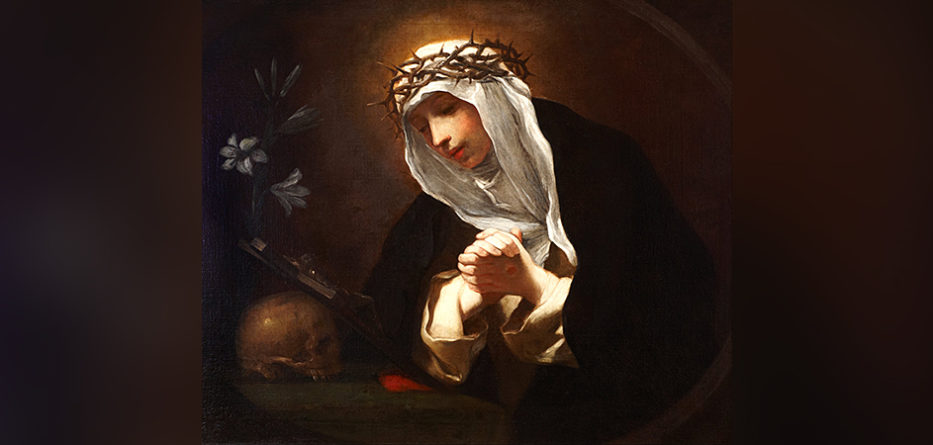Wondering again about who else there was in our history who may have something to say to us about women in the church and their role today, the name St Catherine of Siena came to my mind. Catherine was a strong, courageous and purposeful woman, never afraid to speak her mind and to call clerics to account when she saw the need.
St. Catherine was born Caterina di Giacomo di Benincasa in Sienna in 1347. When she turned sixteen, Catherine took the habit of the Third Order of St. Dominic and “cloistered” herself in a little room in her parent’s house for three years. After this time, she returned to the family and began active works of caring for the sick and the poor.
Catherine eventually became a mystic, a contemplative in action and a challenger and a critic of the popes and clerics of her time. She began to preach, scandalous to some clerics, sometime during the last eight years of her life. Her confessor, Blessed Raymond of Capua said if men would listen to her humbly:
welcoming and heeding, with all due submission,
the woman sent by God,
the Church would benefit greatly.
Catherine’s great concern was the state of the Church and its need to reform. Mainly through the misgovernment of the papal officials, war broke out between Florence and the Holy See, and nearly all of the Papal States rose in insurrection. Around 1367, Catherine, in one of her letters to Pope Gregory X1, who resided at that time in Avignon, sent an urgent request that he return to Rome. In her words, “be a courageous man for me, not a coward”. She was at times affectionate with him, cajoling and familiar, and sometimes threatening. She convinced him to take action and he returned to Rome in 1378.
Pope Urban VI followed after Gregory died, amidst an opposed powerful faction. Although he called Catherine to Rome to support his cause, he had no intention of supporting her.
From the outset, Catherine enthusiastically adhered to the Roman papacy and in Rome, she spent the rest of her life working strenuously for the reformation of the Church and serving the poor and afflicted.
Catherine left a collection of nearly four hundred letters, many of which are addressed to popes, rulers, and leaders of armies. She died in 1380 after much suffering and giving her life to reform the Church.
She was declared a doctor of the church by Pope Paul XI in 1970 and a patron saint of Europe in 1999.
Catherine’s story speaks for itself really, but I have reflected on it nevertheless in terms of what message it might have for us in the Church of today. The common thread in the lives of the women I have written about to date is that of being heard, and having the courage to speak out against any kind of clerical abuse of power. The courage to speak is a call… but it must be spoken in a way whereby it can be heard. To that end, it must convey truth, justice, mercy and love. Courage and conviction are called for.
Men and women, bishops and priests of today need more than ever to reflect on the life of Catherine of Siena and what it might have to teach us. We could wonder whether there is something in her life that God might be asking us to hear, to follow, to act upon in the same way in our own present circumstances. To reflect is to empty oneself of all preconceived ideas and ideals and to wonder, gently and peacefully. As Elijah found out, God usually speaks in whispers; in gentle breezes, and not in earthquakes.
The Lord said, “Go out and stand on the mountain in the presence of the Lord, for the Lord is about to pass by.” Then a great and powerful wind tore the mountains apart and shattered the rocks before the Lord, but the Lord was not in the wind. After the wind there was an earthquake, but the Lord was not in the earthquake. After the earthquake came a fire, but the Lord was not in the fire. And after the fire came a gentle whisper. When Elijah heard it, he pulled his cloak over his face and went out and stood at the mouth of the cave.
Then a voice said to him, “What are you doing here, Elijah?” – 1 Kings 19:11-13 (NIV)
Blessed Raymond of Capua said:
If men would listen to Catherine humbly
welcoming and heeding, with all due submission,
the woman sent by God,
the Church would benefit greatly.
God has spoken powerfully through women over the centuries. Does God still have a voice today, I wondered? Do priests, bishops and archbishops listen with the ear of their heart? (Rule of Benedict Prologue 1) Do we all? For St. Benedict, to listen meant to listen with the ear of the heart. Listening with the ear of our heart requires of us that we be silent and still within as well as without. It’s a strange concept to most of today’s world.
Sr Antonia Curtis OSB is a member of the Benedictine Sisters community at Jamberoo Abbey, NSW.
You can read the full series of six reflections by Sr Antonia Curtis:
- Gifts from the past – St Teresa of Ávila
- Gifts from the Past – St Scholastica of Nursia
- Gifts from the Past – Saints Hilda of Whitby and Hildegard of Bingen
- Gifts from the Past – St Catherine of Siena
- Gifts from the past – St Mary of the Cross MacKillop
- Gifts from the past – Conclusion








